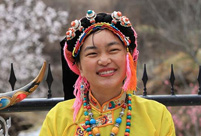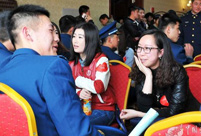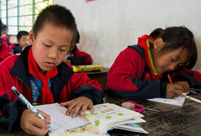 'Model husband' shatters image of love
'Model husband' shatters image of love
 Can animals smile? Or put on a happy face
Can animals smile? Or put on a happy face
 Geng Xuan crowned at 9th China Super Model Contest
Geng Xuan crowned at 9th China Super Model Contest
 Top 10 billionaires in the liquor industry
Top 10 billionaires in the liquor industry
 Backstage at China Fashion Week
Backstage at China Fashion Week
 Ballerinas anywhere but onstage
Ballerinas anywhere but onstage
 Top 10 safest airlines in the world
Top 10 safest airlines in the world
 Posters of 33rd HK Film Awards unveiled
Posters of 33rd HK Film Awards unveiled
 Top 10 most popular instant messaging apps in the world
Top 10 most popular instant messaging apps in the world
 Inspiring shadow images of Chinese army
Inspiring shadow images of Chinese army
Surviving hardship
The establishment of the school came as an accident.
"When Cuicui recovered from depression, she was not willing to go back to school. The school and her relatives also refused to take her back, so she started to live in our hospital ward with three babies carrying HIV, who were born in our hospital," said Guo Xiaoping, the principal of the school and chief director of the Linfen Third People's Hospital.
To alleviate the children's boredom, doctors and nurses brought in a blackboard and four desks, and opened a special class for the children. Hospital staff took turns being temporary teachers and brought the children books from home. "We don't know how long the children will live, but if they stay in hospital all the time, at least they will become literate. We hope they can learn knowledge as they would at school and have fun," Guo said.
A year later, the number of students increased to 16, and the temporary classroom was not large enough. Guo decided to set up a school for his "student" patients. "They are the hospital's children, and the affection between us is quite deep. We have tried our best to take care of them," he said.
However, running a school from scratch was totally different to running a hospital. Without any precedent to go by, the local government refused to provide the Red Ribbon School with certification. "The school is affiliated with our hospital because children need examinations in hospital every three months. But local officials had no experience in approving a hospital school and were not sure how many teachers and doctors were suitable for 25 patients and students," Guo said.
Without certification it was hard for Guo to recruit teachers. "As long as candidates had a teaching certificate, we recruited them all, but the number of teachers and their quality were unstable."
The school's first teacher was so afraid of AIDS that he wore glasses and a white coat in the class, and was not willing to touch the children. "Such behavior made the children stressed, so we asked him to leave," Guo said.
Education expenses were also a big headache for the school without government subsidies. "The hospital exempted children's medical fees, and before the government provided anti-AIDS drugs for free, we had been getting all our medicine from the US-based Clinton Foundation for free and had received donations from the public. To reduce costs, we even grew vegetables by ourselves to become more self-sufficient," he said.
During the first six years, the school ran without certification, so students could not register in the local education system, had no graduation certificate, and were not allowed to attend the entrance examination for high school.
However, the school's destiny took a favorable turn in 2011, when Peng Liyuan, the World Health Organization Goodwill Ambassador for HIV/AIDS, and spouse of now the Chinese President, visited the school and had lunch with students on October 15, 2011. Just two weeks later, the local government approved the school's certification and granted subsidies.
"It all came down to Peng's reputation, and our school was able to get qualifications in such a short period after her visit. Her influence made the government treat us as a very important and special issue," said Guo.


 Wonderful moment of China's airborne forces
Wonderful moment of China's airborne forces Bai Baihe shoots for fashion magazine
Bai Baihe shoots for fashion magazine Red terraced fields in Dongchuan of Yunnan
Red terraced fields in Dongchuan of Yunnan Jiaju Tibetan Village
Jiaju Tibetan Village Spring dating
Spring dating Confucius institute at UC Davis
Confucius institute at UC Davis Little painted faces at temple fair
Little painted faces at temple fair Top 10 safest airlines in the world
Top 10 safest airlines in the world Foreign students at China-Myanmar border
Foreign students at China-Myanmar border The backstage of the Fashion Week
The backstage of the Fashion Week College students in Han costumes
College students in Han costumes Postgraduate works as waitress
Postgraduate works as waitress Life in a Lahu village in Yunnan
Life in a Lahu village in Yunnan An orphan’s wedding
An orphan’s wedding Hollywood documentary brings Diaoyu Islands truth to new audience
Hollywood documentary brings Diaoyu Islands truth to new audienceDay|Week|Month